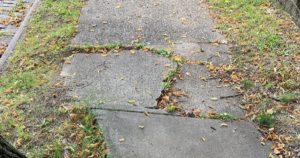The Subsequent Remedial Measure Rule
October 17, 2013 Don’t Be Afraid to Repair a Property Defect or Dangerous Condition
Don’t Be Afraid to Repair a Property Defect or Dangerous Condition
It happens quite frequently. Someone gets hurt at your home or on your property. For example, a person trips and falls because of a raised concrete slab on your sidewalk or slips and falls while walking off your deck steps because there is no handrail.
The injured person hires an attorney and you are sued in a premises liability lawsuit. You would like to do the right thing and fix the raised concrete slab on your sidewalk so it does not continue to create a tripping hazard for others. Or you are thinking about hiring a contractor to install a handrail for the steps leading up to your deck. However, you are now worried that if you fix the unsafe condition your efforts will be used against you in court.
You decide against fixing your property for fear that your actions will be proof that your property was in fact dangerous. While your concern is a valid one, any repairs you make to your property to fix an unsafe condition cannot be used against you.
The law in Pennsylvania protects property or homeowners who fix an unsafe condition following an accident on their property. It is known as the Subsequent Remedial Measure Rule. It is based on social policy. Social policy encourages property and homeowners to correct or fix an unsafe condition on their property after an accident has occurred. The reason behind this social policy is clear. It is more important that property owners fix or repair property defects than have evidence of that repair used against them in a premises liability lawsuit.
If evidence of post-accident repairs were admissible in property liability lawsuits, then property owners would not want to correct the dangerous condition for fear that in doing so it would be held against them. In return for excluding this type of evidence, the law encourages property owners to make the necessary repairs following an accident on their property to prevent a similar mishap or accident from occurring again.
Like a lot of other laws and rules there are some exceptions. If you claim that you do not own the property or do not have any control or right to control the property, but you make post-accident repairs, then that evidence can be used to show you did in fact own the property or have control the property. For most accidents that occur on residential property, this is not normally an issue. If you do own the property or house where the accident occurred, then the law will be on your side to encourage you to fix the property defect after an accident.
The Philadelphia Premises Liability Lawyers at Galfand Berger Are Here to Help You
Premises liability cases, such those involving property defects or unsafe conditions that cause trip and fall accidents, can often involve complicated legal issues and complex factual scenarios. The attorneys at Galfand Berger LLP are experienced litigators and have handled some of the most difficult property liability issues. If you or a loved one has been injured in a trip and fall accident, contact our attorneys for a free consultation to discuss a potential premises liability lawsuit. We will investigate the circumstances of your injuries, identify the parties liable, and seek maximum compensation for your medical expenses, lost income and pain and suffering. Call us today at 1-800-222-USWA (8792) or submit a fee online inquiry.
 Google Screened
Google Screened
